Categories
Archives
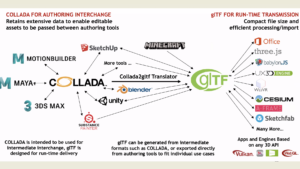
Last week the IPTC held its Autumn Meeting 2022, with over 70 attendees from over 20 countries attending the three-day online event.
Discussions were as wide-ranging as ever. Highlights were a guest presentation on how media organisations can prepare for the Metaverse from startup advisor and previous member of the Microsoft HoloLens team, Toby Allen; intense discussions from members about making our work in machine-readable rights and RightsML simpler and more accessible and to bridge the gap between our simple, lightweight JSON news standard ninjs and our richly structured full-featured XML-based standard NewsML-G2.
We also heard about many other topics:
- Meinolf Ellers at IPTC member dpa spoke about the DRIVE initiative, which follows on from the C-POP project that IPTC advised on in 2019 and 2020. DRIVE allows consortium members to share data about content usage to drive subscriptions and engagement, and to find under-represented areas in their news output to meet audience needs.
- We heard about representing social media content in NewsML-G2: Dave Compton of Refinitiv spoke about their work encoding content from Twitter and other social networks in NewsML-G2 format for re-use, enhancement and syndication.
- Will Kreth, previously CEO of EIDR, spoke about the HAND project which aims to create a unique identifier for media and sports talent
- Fredrik Lundberg from IPTC member iMatrics and guest presenter Jens Pehrson from GOTA Media spoke about a new tool they have developed that allows publishers to track the gender balance in their news content
- Johan Lindgren from IPTC member TT (the Swedish national news agency) spoke about their recent project to develop a classification and entity extraction engine for their news content, based on IPTC Media Topics taxonomy
- We heard from Audren Layeux of CARSA who spoke about the European Media Data Space project, an EU initiative
- Ben Colman, CEO of RealityDefender spoke (direct from TechCrunch Disrupt in San Francisco!) about their deepfake detection technology, used by social media networks, financial institutions and media organisations to detect manipulated images and videos.
- IPTC MD Brendan Quinn spoke about IPTC’s ongoing work with C2PA and Project Origin, including forthcoming additions to C2PA to include video metadata.
In addition, we heard updates from all IPTC Working Groups: Dave Compton introduced NewsML-G2 2.31; Paul Kelly spoke about some new developments in the RDF-based sports data model which will be announced soon; Pam Fisher described the work of the Video Metadata Working Group and the changes coming in Video Metadata Hub v1.4; David Riecks and Michael Steidl spoke about Photo Metadata Standard 2022.1 and the ongoing work of the Photo Metadata Working Group;
The Standards Committee voted in new standard versions: NewsML-G2 v2.31, Video Metadata Hub v1.4, and Photo Metadata Standard 2022.1. These will be released and publicised over the coming weeks.
The IPTC Annual General Meeting 2022 saw Johan Lindgren step down from the Board of Directors after 6 years of service. Thanks very much for all your help, Johan!
We are very happy to welcome a new Board member: Heather Edwards of Associated Press.
Thanks very much to everyone who attended and spoke. You contributed to making it a great event for all!
As usual, full recordings of all sessions are available to IPTC members on the members-only event page.
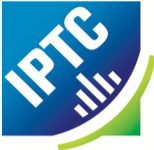 We are excited to present to IPTC members the full agenda for the IPTC Spring Meeting 2021, taking place online from Monday May 10th to Wednesday May 12th.
We are excited to present to IPTC members the full agenda for the IPTC Spring Meeting 2021, taking place online from Monday May 10th to Wednesday May 12th.
We are honoured to have presentations from IPTC members Adobe, BBC, Agence France-Presse (AFP), The New York Times, Bloomberg, Austria Press Agentur (APA) and new member Scribely, along with guest presentations from the World Wide Web Consortium (W3C), Data Language, TV2 Denmark, and YLE Finland.
Themes include
- metadata for content accessibility;
- knowledge graphs and semantic technologies in news and media; and
- trust and credibility, including a presentation by Leonard Rosenthal of the new Coalition for Content Authenticity and Provenance
Plus we will have all our regular presentations from our Working Groups in NewsML-G2, Photo Metadata, Video Metadata, NewsCodes (including Media Topics), News in JSON and Sports. We will also have sessions for our Standards Committee and PR Committee.
There will also be some time allocated each day to member networking. While we can’t match the networking opportunities of an in-person meeting, we will be using some new tools to make networking more interesting and approachable for members.
We are also planning to hold a special webinar the week before the meeting Introducing knowledge graphs for the media, so we can get straight into the interesting content during the member meeting and not spend time introducing the concepts.
All IPTC member organisations are welcome to attend at no cost.
IPTC members can see more information on the Spring Meeting 2021 page in the IPTC Members-Only Zone.
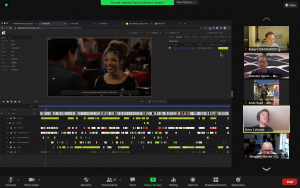
We had a great IPTC Member Meeting last week, our second online event. We’re getting used to online events now!
After introductions and a get-to-know-your-fellow-members session, Dave Compton of Refinitiv presented the NewsML-G2 Working Group‘s report. We didn’t have a new version of NewsML-G2 this time but we are doing work on making NewsML-G2 easier to understand and to use. We have been working on a NewsML-G2 Generator (soon to be launched), NewsML-G2 unit tests and a Python module. Some proposals for additions to NewsML-G2 were also discussed.
Brendan Quinn, IPTC Managing Director then hosted a re-introduction to semantic web technology: RDF, SPARQL, schema.org and how they relate to GraphQL, knowledge graphs and other buzzwords in 2020’s world of data. This proved to be a useful background and refresher for many of the following sessions over the next three days that touched upon semantic technology in almost every presentation!
Paul Kelly, individual member and group lead, presented the Sports Content Working Group‘s report highlighting the work that the group is pursuing on looking at a more semantically rich successor to SportsML.
Jennifer Parrucci of The New York Times presented the NewsCodes Working Group report. The focus since the last meeting was on a new batch of Media Topics terms, refreshing some labels and definitions, and adding more translations – we are now up to 11 languages in the Media Topics vocabulary! We have also updated the Genres vocabulary and launched the Trust Indicators CV.
Still on metadata and controlled vocabularies, we hosted a presentation and discussion session about Named Entities for News, including presentations by IPTC members Christoffer Krona from iMatrics, Jennifer Parrucci from The New York Times and Jeremy Tarling from BBC showing their organisations’ approach to managing metadata for named entities such as people, places and organisations. We had an interesting discussion about how IPTC can help the industry to move forward in managing named entities. Look out for more information from us soon!
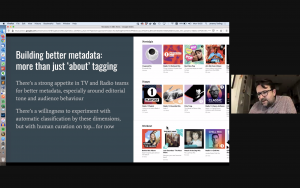
On Tuesday, we started with Michael Steidl‘s Photo Metadata Working Group presentation, including a report on how the Google Licensable Images work has been received. Pam Fisher, lead of the Video Metadata Working Group then presented ongoing work towards a new user guide for video metadata, based on use cases and scenarios so we can make video metadata more approachable for people in different parts of the media industry.
Johan Lindgren of TT Nyhetsbyrån presented the work of the News in JSON Working Group, including discussions of work towards a ninjs 2.0, looking at how ninjs can map to binary serialisation formats such as Protocol Buffers and Avro, and support for machine-readable rights in ninjs documents.
The second half of Tuesday was filled by the IPTC Photo Metadata Conference 2020 – see our separate news post about that event!
Wednesday morning was dedicated to important IPTC internal business, including the IPTC 2020 Annual General Meeting, where we re-elected the current board including Robert Schmidt-Nia of DATAGROUP as IPTC Chair. Linda Burman, individual member and Chair of the PR Committee,
We also held the Autumn 2020 IPTC Standards Committee Meeting, chaired by Stéphane Guérillot of Agence France-Presse, where we discussed our ongoing project to “make IPTC standards more usable”. If you have any ideas about how we can make our work more usable or more accessible, please get in touch!
We ended the day with presentations from Laurent Le Meur of EDRLab, Steve Callanan of WireWax presenting their video analysis and manipulation tools, and Andy Read of the BBC speaking about their implementation of the GRID open source image management system.
IPTC members can find PDFs of all presentation files on the members-only event page.
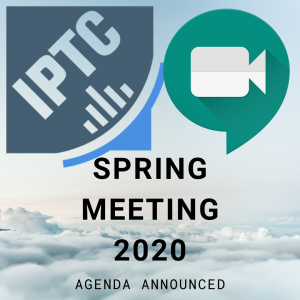 The agenda for the IPTC Spring Meeting (May 11 – 13 2020) has been announced, featuring a focus on news automation.
The agenda for the IPTC Spring Meeting (May 11 – 13 2020) has been announced, featuring a focus on news automation.
Brendan Quinn, Managing Director of IPTC, says “we are very excited to host the first virtual meeting of IPTC. All members are encouraged to attend via Zoom video conferencing, and we hope that many members who find it difficult to travel to the face-to-face meetings will take the opportunity to attend the online meeting.”
Presentations and topics for discussion will include:
- Ed Boyling of Thomson Reuters will present their Lynx Insight system which blends human and machine insights for news creation. Tao Chen of 500px / Visual China Group, Lead of IPTC’s AI Expert Group will present on 500px’s work on AI stock photos. Claudia Quinonez of Bloomberg will give a presentation on “Deep Data-driven Stories”
- Presentations and discussion on metadata entities with Fredrik Lundberg of iMatrics and Joacim Ståhl from TT
- Updates from IPTC Working Group leads on the latest proposed updates to ninjs, NewsML-G2 and Video Metadata Hub, and voting on the proposals by the IPTC Standards Committee
- The latest work of the Photo Metadata Working Group, including recent work with Google on surfacing embedded copyright and licensing metadata in Google Image Search results
- A presentation from W3C Web Publications working group on the Web Publications standard
- Updates on IPTC’s recent work on the Google News Initiative project C-POP and on our work on expressing trust and credibility indicators in news content
The meeting will be held on the originally planned days — Monday 11th through to Wednesday 13th May 2020 — but will take place over five hours each day so attendees still have some time to do other work if necessary.
Attendance is free for all IPTC members. Members should sign up at the members-only registration page to be sent an invitation link.
There is still time to join IPTC to attend the meeting. If you are interested in joining IPTC, please see the join IPTC page.
The IPTC Board was looking forward to having a meeting in Tallinn, Estonia, and hopes that we will be able to have an in-person meeting in Tallinn in coming years.